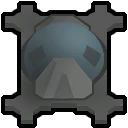Difference between revisions of "Ground-penetrating scanner"
| Line 26: | Line 26: | ||
A '''ground-penetrating scanner''' detects and illuminates underground deposits of resources, either [[jade]] or [[metals]]. Extracting materials from these deposits requires a [[deep drill]]. | A '''ground-penetrating scanner''' detects and illuminates underground deposits of resources, either [[jade]] or [[metals]]. Extracting materials from these deposits requires a [[deep drill]]. | ||
| − | The [[Research#Ground-penetrating scanner|Ground-penetrating scanner]] project must be researched before it becomes available, and needs [[power]] to function. A scanner is one of the most power-hungry devices. During operation, a researcher will work at it, periodically finding new mineral deposits. This process can repeat indefinitely meaning that maps will not run out of resources. | + | The [[Research#Ground-penetrating scanner|Ground-penetrating scanner]] project must be researched before it becomes available, and needs [[power]] to function. A scanner is one of the most power-hungry devices. During operation, a researcher will work at it, periodically finding new mineral deposits. This process can repeat indefinitely meaning that maps will not run out of resources. |
The ground-penetrating scanner is not usable if there is a roof over it. (Similar to the [[long-range mineral scanner]].) If necessary (such as in an extreme environment) the ground penetrating scanner can be placed in a room with at least 24 tiles, with the six tiles it occupied being unroofed. This allows the room to be heated, although inefficiently, without the temperature immediately equalizing to the outdoor temperature. Having a larger room with double-thick walls allows for more efficient heating. | The ground-penetrating scanner is not usable if there is a roof over it. (Similar to the [[long-range mineral scanner]].) If necessary (such as in an extreme environment) the ground penetrating scanner can be placed in a room with at least 24 tiles, with the six tiles it occupied being unroofed. This allows the room to be heated, although inefficiently, without the temperature immediately equalizing to the outdoor temperature. Having a larger room with double-thick walls allows for more efficient heating. | ||
| Line 33: | Line 33: | ||
== Resources == | == Resources == | ||
| − | The resources contained in a deposit correlates with the size of the deposit. Below is an estimate of the different deposit sizes: | + | The resources contained in a deposit correlates with the size of the deposit. Each cell of resources contains 300 units of the resource. Below is an estimate of the different deposit sizes: |
<div><li style="display: inline-table;"> | <div><li style="display: inline-table;"> | ||
{| {{STDT| sortable c_25 text-center}} | {| {{STDT| sortable c_25 text-center}} | ||
Revision as of 05:10, 7 September 2021
| This article is suggested to be rewritten. Reason: Format standardisation. You can help the RimWorld Wiki by improving it. |
Ground-penetrating scanner
A sensor unit used by researchers to search for buried resources. The chance to find a resource depends on the operator's research ability. It consumes a lot of electricity. If you find a buried resource, you'll need to use deep drills to extract it. It doesn't work under a roof.
Base Stats
Building
- Size
- 2 × 3
- Placeable
- Yes
- Cover Effectiveness
- 40%
- Power
- - 700 W
Creation
- Skill Required
- Construction 8
- Work To Make
- 12,000 ticks (3.33 mins)
A ground-penetrating scanner detects and illuminates underground deposits of resources, either jade or metals. Extracting materials from these deposits requires a deep drill.
The Ground-penetrating scanner project must be researched before it becomes available, and needs power to function. A scanner is one of the most power-hungry devices. During operation, a researcher will work at it, periodically finding new mineral deposits. This process can repeat indefinitely meaning that maps will not run out of resources.
The ground-penetrating scanner is not usable if there is a roof over it. (Similar to the long-range mineral scanner.) If necessary (such as in an extreme environment) the ground penetrating scanner can be placed in a room with at least 24 tiles, with the six tiles it occupied being unroofed. This allows the room to be heated, although inefficiently, without the temperature immediately equalizing to the outdoor temperature. Having a larger room with double-thick walls allows for more efficient heating.
The mean time between finding deposits is dependent on the Research Speed of the user.
Resources
The resources contained in a deposit correlates with the size of the deposit. Each cell of resources contains 300 units of the resource. Below is an estimate of the different deposit sizes:
| Resource | Deposit Size | Deposit Mean | Commonality | Portion Size | Avg Deposit Return |
|---|---|---|---|---|---|
| 20 - 40 | ~ 30 | 4 | 35 | ||
| 7 - 20 | ~ 14 | 0.5 | 40 | ||
| 2 - 10 | ~ 7 | 1 | 7 | ||
| 1 - 5 | ~ 3 | 0.5 | 10 | ||
| 1 - 5 | ~ 3 | 0.5 | 10 | ||
| 4 - 10 | ~ 7 | 1 | 10 |
Alternative table:
| Resource | 1-5 | 6-10 | 11-15 | 16-20 | 21-30 | 31-40 |
|---|---|---|---|---|---|---|
| - | - | - | - | |||
| - | - | - | ||||
| - | - | - | - | - | ||
| - | - | - | - | - | ||
| - | - | - | - | |||
| - | - | - | - |
Version history
In Beta 19 its power usage was significantly reduced from 1500W to 800W. Its build cost was also changed, previously costing 400 steel and 12 components.
In 1.1 it was reworked; previously it showed all minerals on the map instantly. Its power cost was also slightly lowered to 700W.
